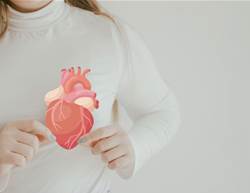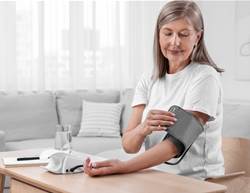You've heard for years about the healthy habits that keep your ticker ticking. But it's not always easy to play by these rules in real life, when stress and crazy schedules get in the way. That's why we went to some of the most overworked, overstressed people we know – cardiologists – to find out what they do to keep their hearts healthy and sneak good-for-you habits into their lives.
"I sneak in veggies by blending them all into a smoothie. During my first year of medical school, I realised I never had time to sit down and eat a salad. So I started blending one before I went to work every morning: I'd throw some capsicums, carrots, celery, antioxidant-rich berries, and a dash of cayenne in (for a little zing), and bring the drink with me to the hospital. People got used to seeing me on campus holding a jar with my vegie shake. Now I throw all the vegies into the blender the night before, so at 6 AM I can just add water and lemon juice, blend for a couple minutes, and then go."
—Sheila Sahni, MD, cardiologist at the Ronald Reagan UCLA Medical Center in Los Angeles.
"I have an alarm on my phone that says "exercise" every day at 3 PM. My residents laugh at me, but I tell them that it's the only way I can make sure I get enough activity. As soon as that alarm goes off, I check my pedometer. If I haven't clocked 10,000 steps yet, then as soon as I can take a break, I go out and take a short walk, run up and down the hospital stairs for 10 minutes—anything to make sure I reach my goal. I also installed an app on my phone that I absolutely love, called HeadSpace, which quickly leads you through a bunch of relaxation meditation exercises. I make sure I peek at it while I'm at work at least once a day."
—Karol Watson, MD, director of the Women's Cardiovascular Center at UCLA.
"Every time I go out to eat at a restaurant, I order fish. It's one of the foods I know I should be eating regularly, but I can't stand the smell when I prepare it at home. This way, I get my heart healthy omega-3s in and know I'm choosing something that's relatively low in fat and kilojoules. I also do my own yard work. I don't just save money; I get a great workout pushing the mower and gardening has become my therapy."
—Allen Taylor, MD, chief of cardiology with MedStar Heart & Vascular Institute at MedStar Washington Hospital Center, in Washington, DC.
"I carry my gym bag with me everywhere I go. I usually exercise 60 to 90 minutes a day—I'm currently training for a half marathon—but fitting it into my crazy schedule is daunting. This way, if I have an hour between patients in the hospital, I can just scoot out for a run. I also do yoga twice a week and make sure I get in some meditation every day—usually 10 to 15 minutes of deep breathing, where I focus on different parts of my body—before I fall asleep."
—Katie Berlacher, MD, cardiologist at the University of Pittsburgh Heart and Vascular Institute in Pittsburgh.
"I do positive visualisation when I'm stressed, since I often don't have the time to incorporate a stress reduction activity like meditation into my schedule. For example, if I'm wheeling a very sick patient from the ER to the catheter lab, I take some deep breaths as I'm pushing them and imagine doing the procedure and it being a success."
—Sheila Sahni, MD.
"I recently did an online calculation to determine my heart age and found out, to my shock, that it was older than my actual age. So I've made quite a few changes. The biggest one is carving out time to exercise. I've made it clear to my family that when I come home from work, the first 30 to 45 minutes are for me to move. Otherwise I'll never fit it in."
—Seth Jacobson, MD, medical director of cardiac rehab at the University of Rochester Medical Center in Rochester, NY.
"I take 1,200 mg of aged garlic extract daily. This form of garlic is odorless, so you don't smell like an Italian restaurant, and there's good research to show it lowers cholesterol and blood pressure. I also take a 500 mg magnesium supplement every day since I drink a lot of coffee, which is a diuretic and causes you to lose magnesium when you urinate. Low magnesium is linked to irregular heartbeat, so I feel like this is a little extra insurance to keep it healthy."
—Matthew Budoff, MD, cardiologist at David Geffen School of Medicine at UCLA.










